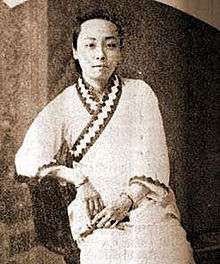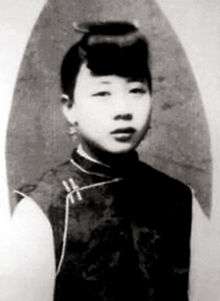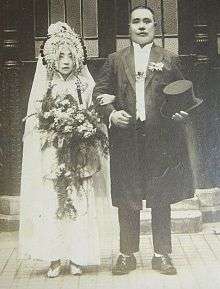Sai Jinhua

Sai Jinhua (traditional Chinese: 賽金花; simplified Chinese: 赛金花; pinyin: Sài Jīnhuā; Wade–Giles: Sai Chin-hua; "Prettier Than Golden Flower";[1] circa 1872-1936[2]) was a Chinese courtesan who became the acquaintance of Alfred von Waldersee.[3] Her real family name was Cao. Sometimes she said her family name was Zhao. During her career as a courtesan she used the names Fu Caiyun (傅彩云; 傅彩雲; Fù Cǎiyún; Fu Ts'ai-yün), Sai Jinhua, and Cao Menglan (曹梦兰; 曹夢蘭; Cáo Mènglán; Ts'ao Meng-lan). Her art name (hao) was Weizhao Lingfei (魏赵灵飞; 魏趙靈飛; Wèizhào Língfēi; Wei-chao Ling-fei). Some people referred to her as Sai Erye (赛二爷; 賽二爺; Sài èryé; Sai erh-yeh, "Second Master Sai").[4]
Wenxian Zhang, author of an encyclopedia article on Sai Jinhua, wrote that she "was regarded by some as a cross-cultural courtesan."[5] Wan Xianchu, an author of an encyclopedia article on Sai Jinhua, wrote that "regardless of whether Sai Jinhua's role in China's foreign relations may have been exaggerated and despite the controversies surrounding her conduct and affairs, she lived a tough and spectacular life that has assured her a place in the modern history of China."[6]
Biography
Early life

Sai Jinhua was allegedly born with the name Zhao Lingfei (趙靈飛; 赵灵飞; Zhào Língfēi; Chao Ling-fei) on October 9, 1872.[7] Sai Jinhua was from Yancheng, Jiangsu and she lived in Suzhou as a child.[3] Her ancestral home was Xiuning, Anhui.[4] At age 13 she became a prostitute after her father died and financial difficulties for her family occurred.[3] She first became a prostitute while on a flower boat.[4] At that time she used the professional name "Fu Caiyun". In 1887 Hong Jun, a major Chinese official, met Sai Jinhua while he visited Suzhou.[3] At the time Hong Jun was in mourning due to his mother's death. Hong Jun made Sai Jinhua his concubine one year after meeting her.[4] When she became his concubine she began using the name Hong Mengluan (洪夢鸞; 洪梦鸾; Hóng Mèngluán; Hung Meng-luan).[7] In April of that year, Sai Jinhua went to Beijing with Hong Jun.[4]
Empress Dowager Cixi appointed Hong Jun as the Chinese envoy to Europe, and so Hong Jun traveled to Russia, Austria, the Netherlands, and Germany as part of his diplomatic duties.[3] Sai Jinhua accompanied him for the five year term because Hong Jun's wife was unwilling to travel with him.[7] Sai Jinhua lived in Europe for three years.[4]
In Berlin, Hong Jun did not allow Sai Jinhua to attend most of his parties, including those that he held at his residence. She was unable to dance at the parties she did attend due to her bound feet and because Hong Jun asked her not to.[1] Wenxian Zhang, author of the Encyclopedia of Prostitution and Sex Work, Volume 2, wrote that when Sai Jinhua was in Berlin, she reportedly became the acquaintance of Alfred von Waldersee.[3] David Der-wei Wang, author of Fin-de-siècle Splendor: Repressed Modernities of Late Qing Fiction, 1849-1911, wrote that the affair between Sai Jinhua and Waldersee began at that point as legends have it.[8] In addition to Waldersee, she met Emperor William II, Chancellor Otto von Bismarck, and German Empress Victoria in Berlin. She had also visited St. Petersburg, Vienna, The Hague, Paris, and London.[4] After the end of the diplomatic tour, the couple moved to Beijing.[3]
Sai Jinhua gave birth to her daughter Deguan (德官; Déguān; Te-kuan) in 1890.[4] Hong Jun died in 1893, shortly after his return to China. In 1894 Sai Jinhua became a prostitute again because Hong Jun's relatives did not support her financially.[3] Sai Jinhua and her daughter Deguan had accompanied the coffin of Hong Jun as it was returned to Suzhou.[4] When she resumed her prostitution career she used the stage name "Cao Menglan".[3] She became a celebrity since she had been in a relationship with a Chinese envoy to Europe. In 1898, she had to move her business out of Shanghai. After re-establishing it in Tianjin she took the name "Sai Jinhua".[7] Several years after restarting her prostitution career she started the Golden Flower Troupe (金花班; Jīnhuā bān; Chin-hua pan), a courtesan theater company. This troupe became known in Beijing and Tianjin.[3] Her prostitution business moved to Beijing in 1899.[7]
Boxer Rebellion
In 1900 Waldersee became the chief commander of the occupation army after the end of the Boxer Rebellion. Sai Jinhua renewed her connection with Waldersee.[3] Ying Hu, author of Tales of Translation: Composing the New Woman in China, 1899-1918, stated that Waldensee much favored Sai Jinhua allegedly due to her proficiency in several European languages.[2] Ying Hu wrote that she allegedly tried and sometimes succeeded in curbing the brutality of the troops through her bedside conversations with Waldersee.[2] Wenxian Zhang wrote that Sai Jinhua "was credited with influencing Waldsee [sic] to moderate the harsh treatment of Beijing residents."[3] After the end of the Boxer-related hostilities, Sai Jinhua continued to be a prostitute. Wenxian Zhang wrote that the Qing Dynasty government was not grateful for her efforts.[3]
Fan Zengxiang wrote some poems about Sai Jinhua and Waldersee. David Der-wei Wang wrote that the poems consolidated the legend.[8] The poem repeated a rumor stating that the two were in the palace of the Empress Dowager and that they ran out of it naked when a fire occurred.[8] Sai Jinhua, in her biography, admitted that she was on good terms with Waldersee but, as stated by Hu Ying, she vigorously disputed that she had a sexual relationship with him.[2] Dewei Wang wrote that because of several reasons, including differences in political concerns, social status, and age, a romance between the two had not likely happened.[9] David Wang wrote that "It is believed, however, that Sai Jinhua might have had contacts with some lower-ranking German officers at the time, thanks to her ability to speak a little German."[10]
Later life

In 1903, along Shaanxi Lane, Sai Jinhua created a Nanban, or a southern prostitute troupe.[11] She capitalized on the rumors of her romance with Waldersee and became very popular.[10] In 1905 Fengling, a courtesan working under Sai Jinhua's direction, committed suicide, Authorities charged Sai Jinhua of torturing Fengling, causing her to commit suicide.[11] Sai Jinhua was placed in prison due to the charge.[3] Sai Jinhua spent most of her funds having the charges reduced to manslaughter.[11] Sai Jinhua was expelled from Beijing,[10] and therefore banished to her hometown.[3] In 1908 Sai Jinhua's daughter Deguan died.[11]
She married a railroad official, Huang, in 1908. He died in the beginning of the Republican Era.[12] Afterwards she had lived with a Mr. Cao.[11] Subsequently she married a member of the National Assembly,[3] Wei Sijiong, who was a former head of the Jiangxi Province Bureau of Civil Affairs. On 20 June 1918 they married in Shanghai. Sai Jinhua adopted the art name (hao) Weizhao Lingfei, which used a combination of her family name with that of her husband, to show her devotion to him. The couple moved to Beijing.[11] Sai Jinhua's mother died in 1922. Wei Sijiong, Sai Jinhua's husband, died shortly afterwards and his family refused to allow Sai Jinhua to share his property. The widow began smoking opium and she lived in solitude in her remaining years.[6] Sai Jinhua, who was in poverty at the time of her death,[3] had a sole source of income. Journalists and historians who had a curiosity about her case sometimes gave her money.[10]
Sai Jinhua died in 1936,[3] succumbing to an illness at 62 sui.[6] At the time of her death, Beijing was experiencing a strong winter. A servant found her body the morning after her death.[7] Sai Jinhua was buried in Beijing.[3] Qi Baishi, a well-known calligrapher, crafted her headstone.[7]
Legacy
The life of Sai Jinhua had been adapted into several films, plays, and television series.[13] In works she is portrayed as a heroine of the Chinese nation who saves the country single-handedly during a crisis or as a yaonie (妖孽; yāoniè; yao-nie), a woman with abnormal powers or a female demon. Ying Hu, author of Tales of Translation: Composing the New Woman in China, 1899-1918, wrote that Sai Jinhua "is often portrayed in extreme colors" in fiction.[2]
Ying Hu wrote that "portraits of Sai Jinhua in the first decade of the twentieth century tended to be ambivalent, if not outright censorious."[2] Hu Baoyu (胡寶玉; 胡宝; Hú Bǎoyù; Hu Pao-yü) by Wu Jianren and Fantianlu conglu (梵天廬叢錄; 梵天庐丛录; Fàntiānlú Cónglù; Fan-t'ien-lu Ts'ung-lu; "Anecdotes Collected from the Fantianlu Studio") refer to her negatively.[2] The character Fu Caiyun in Niehai Hua is based on Sai Jinhua.[14] Ying Hu wrote that Sai Jinhua's portrayal in that work was "resolutely ambiguous."[15] In the Nine-tailed Turtle the main character Zhang Qiugu has sexual intercourse with Sai Jinhua. Unlike other portrayals of Sai Jinhua in fiction, in The Nine-tailed Turtle she is portrayed as past her prime.[16]
Beginning in the 1930s several works portrayed Sai Jinhua in a positive manner. In 1933 Liu Bannong, a professor of Chinese literature at Peking University, conducted an interview with Sai Jinhua. He wrote The Wife of Zhuangyuan: Sai Jinhua, which he called her true story.[2] Wan Xianchu wrote that the Xia Yan drama Sai Jinhua "was a particularly influential work."[6] The writing on the play's title page, "The country is everyone's country; to save the country is everyone's duty", is in Sai Jinhua's own handwriting.[2] Jung Chang wrote that Sai Jinhua was "regarded by many as something of a tragic heroine."[17]
The play The Beauty (simplified Chinese: 风华绝代; traditional Chinese: 風華絕代; pinyin: Fēnghuá Juédài) is also about Sai Jinhua.[18] In 2012 Liu Xiaoqing, who was a prominent actress in the 1980s, played Sai Jinhua in a performance of The Beauty.[19] Chang Dai-chien, a painter, made a stone engraving portrait of Sai Jinhua.[7]
References
- Hu, Ying. Tales of Translation: Composing the New Woman in China, 1899-1918. Stanford University Press, 2000. ISBN 0804737746, 9780804737746.
- (in French) Lévy, André. "Fleur sur l'océan des péchés". (book review of Niehai Hua, Archive). Études chinoises, No. 1, 1982.
- McMahon, Keith. Polygamy and Sublime Passion: Sexuality in China on the Verge of Modernity. University of Hawaii Press, 2010. ISBN 0824833767, 9780824833763.
- Wan, Xianchu. Translation: Poon Shuk Wah. "Sai Jinhua." In: Lee, Lily Xiao Hong and A. D. Stefanowska (editors of entire work). Ho, Clara Wing-chung (The Qing Period Editor). Biographical Dictionary of Chinese Women (中國婦女傳記詞典) The Qing Period, 1844-1911. M.E. Sharpe, January 1, 1998. ISBN 0765618273, 9780765618276.
- Wang, David Der-wei. Fin-de-siècle Splendor: Repressed Modernities of Late Qing Fiction, 1849-1911. Stanford University Press, 1997. ISBN 0804728453, 9780804728454.
- Zhang, Wenxian. "Sai Jinhua." In: Ditmore, Melissa Hope (editor). Encyclopedia of Prostitution and Sex Work, Volume 2. Greenwood Publishing Group, January 1, 2006. ISBN 0313329702, 9780313329708.
- Zurndorfer, H. et al. (editors) Nan Nü: Men, Women, and Gender in Early and Imperial China, Volume 1. Brill Publishers, 1999.
Notes
- 1 2 Chang, Jung. Empress Dowager Cixi: The Concubine Who Launched Modern China (eBook). Alfred A. Knopf, New York, 2013. eBook ISBN 978-0-385-35037-2. p. 118. "Her minister to Berlin, Hung Jun, was quite the opposite of Guo[...]" - Hardcover ISBN 978-0-307-27160-0
- 1 2 3 4 5 6 7 8 9 Hu, Ying, p. 53.
- 1 2 3 4 5 6 7 8 9 10 11 12 13 14 15 16 17 18 19 Zhang, Wenxian, p. 423.
- 1 2 3 4 5 6 7 8 9 Wan, p. 182.
- ↑ Zhang, Wenxian, p. 424.
- 1 2 3 4 Wan, p. 184.
- 1 2 3 4 5 6 7 8 Cheng, Joyce. "Who is Sai Jinhua?" (Archive) gbtimes. Wednesday September 11, 2013. Retrieved on November 26, 2013.
- 1 2 3 Wang, David Der-wei, p. 103.
- ↑ Wang, David Der-wei, p. 103-104.
- 1 2 3 4 Wang, David Der-wei, p. 104.
- 1 2 3 4 5 6 Wan, p. 183.
- ↑ H. Zurndorfer et al., p. 126
- ↑ Zhang, Wenxian, p. 423-424.
- ↑ Lévy, p. 77. "Mais il a su plier ce cadre aux besoins d'un roman d'idées en multipliant les conversations qui ne font guère progresser l'intrigue à ramifications et retours au fil principal que constitue le personnage de Fu Caiyun 傅彩雲 (c'est-à-dire Sai Jinhua 賽金花 [sic] — rôle[...]"
- ↑ Hu, Ying, p. 54.
- ↑ McMahon, p. 131.
- ↑ Chang, Jung. Empress Dowager Cixi: The Concubine Who Launched Modern China (eBook). Alfred A. Knopf, New York, 2013. eBook ISBN 978-0-385-35037-2. p. 295. - Hardcover ISBN 978-0-307-27160-0
- ↑ "Liu Xiaoqing plays the role of Sai Jinhua." (Archive) China Daily at Sina English. February 1, 2013. Retrieved on October 30, 2013.
- ↑ "Chinese actress Liu Xiaoqing performs in drama 'Fenghua Juedai'." (Archive) China Daily. July 10, 2012. Retrieved on November 7, 2013.
Further reading
In English:
- McAleavy, Henry. That Chinese Woman: The Life of Sai-chin-hua. George Allen and Unwin (London), 1959.
In Chinese:
- Chen, Fan (S: 陈 蕃, P: Chén Fán). Huashuo Sai Jinhua (S: 话说赛金花, P: Huàshuō Sài Jīnhuā). Mingren zhuanji (名人传记). 1988. Issue #6.
- Ke, Xing (S: 柯 兴, P: Kē Xīng). Qingmo mingji Sai Jinhua zhuan (S: 清末名妓赛金花传, P: Qīngmò míngjì Sài Jīnhuā zhuàn "Biography of late Qing Dynasty courtesan Sai Jinhua"). Huayi chubanshe (S: 华艺出版社, P: Huáyì chūbǎnshè) (Beijing), August 1995. ISBN 9787800393761. - There may be a 1992 printing too.
- Liu, Bannong (T: 劉半農, S: 刘半农, P: Liú Bànnóng) and Shang Hongkui (T: 商鴻逵 S: 商鸿逵, P: Shāng Hóngkuí). Sai Jinhua benshi (T: 賽金花本事, S: 赛金花本事, P: Sài Jīnhuā Běnshì). Xingyuntang shudian (T: 星雲堂書店, S: 星云堂书店, P: Xīngyúntáng Shūdiàn) (Beiping), 1934.
- Republished by Yuelu shushe (S: 岳麓书社, P: Yuèlù shūshè) (Changsha), 1985, Unified Book Number (统一书号): 11285-42.
- Republished by China Renmin University Press (S: 中国人民大学出版社, P: Zhōngguó Rénmín Dàxué Chūbǎnshè), May 2006, ISBN 9787300072777.
- Sun, Zhen (S: 孙 震, P: Sūn Zhèn) (editor). Sai Jinhua qiren (S: 赛金花其人, P: Sài Jīnhuā qí rén). Chongqing chubanshe (S: 重庆出版社, P: Chóngqìng chūbǎnshè) (Chongqing), 1987. - See entry in Google Books
- Tong, Xun (S: 佟洵, P: Tóng Xún). "Sai Jinhua" (S: 赛金花, P: Sài Jīnhuā). In: Qingdai renwu zhuangao (S: 清代人物传稿, P: Qīngdài Rénwù Zhuàngǎo), Ser 2. Liaoning People's Publishing House (S: 辽宁人民出版社, P: Liáoníng Rénmín Chūbǎnshè) (Shenyang), 1992. Volume 7, p. 339-342. ISBN 9787101013153.
- Wan, Xianchu (T: 萬献初, P: Wàn Xiànchū). Zhong Guo Ming Ji (T: 中國名妓, P: Zhōngguó Míngjì, W: Chung-kuo Ming-chi; "Famous Prostitutes of Ancient China"). Xiapu Press (C: 夏圃出版, P: Xiàpǔ Chūbǎn), Taipei, 1994.
- Wang, Jianyuan (王健元 Wáng Jiànyuán) (editor). Mingji Sai Jinhua yishi (S: 名妓赛金花遗事, P: Míngjì Sài Jīnhuā Yíshì). Jilin wenshi chubanshe (吉林文史出版社 Jílín wénshǐ chūbǎnshè) (Changchun), 1986. - See Google Books page
- Zeng, Fan (C: 曾 繁, P: Zēng Fán). Sai Jinhua waizhuan (T: 賽金花外傳, S: 赛金花外传, P: Sài Jīnhuā Wàizhuàn; "Unofficial Biography of Sai Jinhua"). Daguang shuju (T: 大光書局, S: 大光书局, P: Dàguāng Shūjú) (Shanghai), 1936.
- Zhang, Cixi (T: 張次溪, S: 张次溪, P: Zhāng Cìxī, W: Chang Tz'u-hsi) (editor). Lingfei ji (T: 靈飛集, S: 灵飞集, P: Língfēi jí, W: Ling-fei chi). Tianjin shuju (T: 天津書局, S: 天津书局, P: Tiānjīn shūjú, W: T'ien-chin Shu-chü) (Tianjin), 1939.
- Zhao, Shuxia (S: 赵淑侠, P: Zhào Shūxiá). Sai Jinhua (S: 赛金花, P: Sài Jīnhuā). Beijing Shiyue Wenyi Chubanshe (S: 北京十月文艺出版社, P: Běijīng Shíyuè Wényì Chūbǎnshè) (Beijing), October 1990. ISBN 9787530201732. - See Google Books page, See Douban page
In German:
- Minden, Stephan von. Die merkwürdige Geschichte der Sai Jinhua.: Historisch-philologische Untersuchung zur Entstehung und Verbreitung einer Legende aus der Zeit des Boxeraufstandes. (Volume 70 of Münchener ostasiatische Studien, ISSN 0170-3668) Franz Steiner Verlag, 1994. ISBN 3515066152, 9783515066150.
- Schwarz, Rainier. "Sai Jinhua und das Ketteler-Denkmal." (Archive) Nachrichten der Gesellschaft für Natur- und Völkerkunde Ostasiens (NOAG), University of Hamburg. Volume 78, Issues 183–184 (2008). p. 149-166.
External links
| Wikimedia Commons has media related to Sai Jinhua. |
- "勾栏胭脂:赛金花两句话拯救故宫天安门." (Archive) Sina.